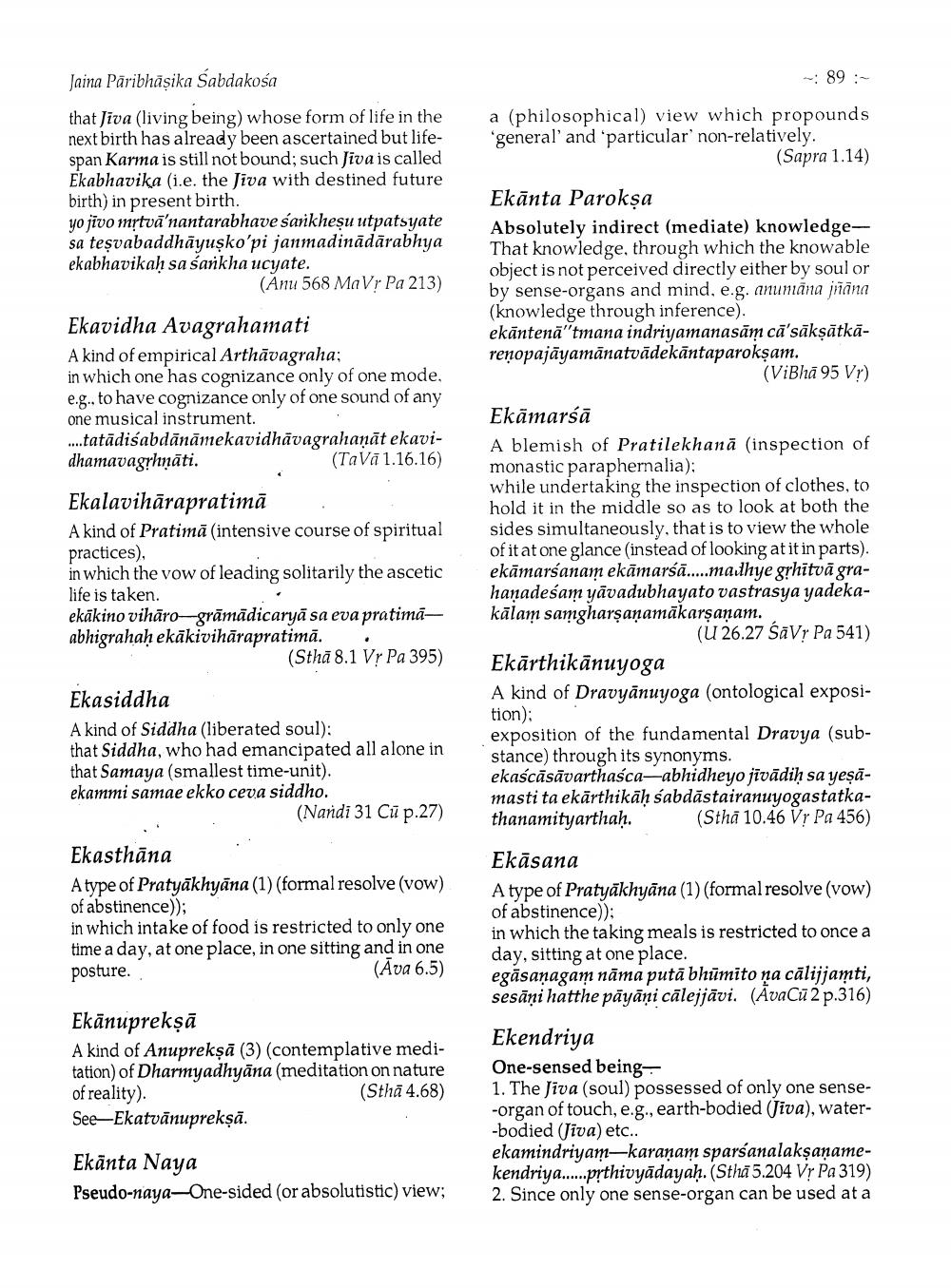________________
Jaina Paribhäsika Sabdakosa
that Jiva (living being) whose form of life in the next birth has already been ascertained but lifespan Karma is still not bound; such Jiva is called Ekabhavika (i.e. the Jiva with destined future birth) in present birth.
yo jivo mrtva'nantarabhave sankheṣu utpatsyate sa teşvabaddhayuṣko'pi janmadinādārabhya ekabhavikaḥ sa sankha ucyate.
(Anu 568 MaVr Pa 213)
Ekavidha Avagrahamati
A kind of empirical Arthavagraha:
in which one has cognizance only of one mode. eg. to have cognizance only of one sound of any one musical instrument.
dhamavagṛhati.
....tatādiśabdānāmekavidhävagrahaṇāt ekavi(Tavā 1.16.16)
Ekalaviharapratimă
A kind of Pratimă (intensive course of spiritual practices),
in which the vow of leading solitarily the ascetic life is taken.
ekakino viharo-grāmādicaryā sa eva pratima— abhigrahaḥ ekakivihärapratima.
(Stha 8.1 Vr Pa 395)
Ekasiddha
A kind of Siddha (liberated soul): that Siddha, who had emancipated all alone in
that Samaya (smallest time-unit). ekammi samae ekko ceva siddho.
(Nandi 31 Cap.27)
Ekasthāna
A type of Pratyakhyāna (1) (formal resolve (vow) of abstinence));
in which intake of food is restricted to only one time a day, at one place, in one sitting and in one posture. (Åva 6.5)
Ekānuprekṣā
A kind of Anuprekṣa (3) (contemplative meditation) of Dharmyadhyāna (meditation on nature of reality). (Stha 4.68)
See-Ekatvanuprekṣā.
Ekanta Naya Pseudo-naya-One-sided (or absolutistic) view;
~89
a (philosophical) view which propounds. 'general' and 'particular' non-relatively.
(Sapra 1.14)
Ekänta Parokṣa
Absolutely indirect (mediate) knowledgeThat knowledge, through which the knowable object is not perceived directly either by soul or by sense-organs and mind, e.g. anumana jñāna (knowledge through inference). ekantena"tmana indriyamanasām cā sākṣātkā
reṇopajayamanatvädekāntaparoksam.
(Vibha 95 Vr)
Ekāmarśā
A blemish of Pratilekhana (inspection of monastic paraphernalia);
while undertaking the inspection of clothes, to hold it in the middle so as to look at both the sides simultaneously, that is to view the whole of it at one glance (instead of looking at it in parts). ekāmarśanam ekamarśa.....madhye grhitvā grahaṇadeśam yavadubhayato vastrasya yadekakālam samgharṣaṇamākarṣaṇam.
(U 26.27 Šavr Pa 541)
Ekarthikanuyoga
A kind of Dravyanuyoga (ontological exposition):
exposition of the fundamental Dravya (substance) through its synonyms. ekaścāsavarthasca abhidheyo jivādiḥ sa yeṣāmasti ta ekarthikäḥ śabdāstairanuyogastatkathanamityarthaḥ. (Stha 10.46 Vr Pa 456)
Ekāsana
A type of Pratyakhyāna (1) (formal resolve (vow) of abstinence));
in which the taking meals is restricted to once a day, sitting at one place.
egasanagam nama puta bhumito na cālijjamti, sesani hatthe payani calejjāvi. (AvaCa 2 p.316)
Ekendriya
One-sensed being
1. The Jiva (soul) possessed of only one sense-organ of touch, e.g., earth-bodied (jiva), water-bodied (Jiva) etc.. ekamindriyam-karanam sparśanalakṣaṇamekendriya......prthivyadayaḥ. (Sth 5.204 Vr Pa 319) 2. Since only one sense-organ can be used at a




